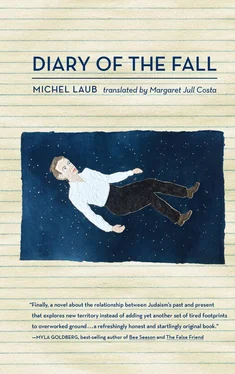24.
When you’re fourteen, it’s highly unlikely that you would wake up at seven in the morning with the house still in silence and instantly slip out of bed and go to the bathroom and then to the kitchen to get something from the fridge, that would only make sense if you’d been woken by a dream or a presentiment or a noise, and whenever my father talked about Auschwitz I think he was remembering precisely that day, my father opening his eyes (Auschwitz) and jumping out of bed (Auschwitz) and opening the door of his room (Auschwitz) and hesitating when he remembered the study where my grandfather had spent that night and every night since he had finally given up his battle with those memories.
25.
When I was fourteen I drank whisky alone in my room because I had come face-to-face with those memories too. They were in the drawings of Hitler, in the notes I wrote about João’s mother, in the certainty that because of them I could never again be João’s friend and would change schools and meet other people and get on with my life never knowing what became of João, if he was alive (Auschwitz), if he was still living in Porto Alegre (Auschwitz), if he had children (Auschwitz), if he became a doctor or a lawyer or a bus conductor (Auschwitz), if even once during those more than twenty years he realized that making a drawing of Auschwitz was the same as making a drawing of his mother’s illness, because Auschwitz was for my grandfather what that illness was for his mother, and my grandfather’s story and his mother’s story were the same.
26.
A story that ends and begins with my father emerging, frightened, from his room next to my grandmother’s, and I don’t know if my grandmother was sleeping or if she had woken up as well, my grandmother alone in her bed, and now they both know they have to go forward, step by step along the corridor, the silence of the house and the world on a Sunday morning on which the only thing that had happened was that bang, a sound my father never stopped hearing, it was there between the lines of all our conversations about my grandfather, every time my father uttered that word, that short, sharp bang was there in every syllable of that word, Auschwitz , my father walking over to the study door, which was locked, because my grandfather made sure of that, making it difficult for someone to open the door because that way he would gain a minute or five or ten or half an hour until they found a way of forcing the lock or kicking in the wooden panels, and with each kick my father somehow knew what he would find on the other side, because he had knocked on the door and called my grandfather and shouted several times and my grandfather couldn’t possibly be sleeping or simply waiting for the door to be broken down, and the short, sharp bang (Auschwitz) that came from the study (Auschwitz) which my father finally managed to enter (Auschwitz) with the help of a crowbar (Auschwitz) would inevitably be what my father had imagined it would be (Auschwitz), a fact he confirmed when he saw, through the crack in the door, my grandfather’s white hair and his head, arms, trunk and whole body slumped across the desk.
You just have to go on the Internet to read that the fifty-two ovens in Auschwitz wouldn’t have been large enough to burn four thousand seven hundred and fifty-six bodies a day, the average needed to achieve the total number of deaths in the official statistics.
There are endless texts stating that the gas chambers could not possibly have worked, because the gas released by the particles of hydrogen cyanide would have dispersed and because of the difficulty of fitting that number of people into one of those compartments without arousing their suspicions. The gas would kill the guards when they went into the chamber after the executions. Even if they had installed some miraculous ventilation system that could eliminate any risk of contact with the respiratory system, even if the guards wore masks, which weren’t 100 percent effective at the time anyway, you would still have to extract every single particle and pump it out into the air, where, of course, it would have killed anyone who happened to be standing downwind — guards, officials, officers.
Just one click and you’ll find someone telling you that there are no photos or architectural plans of the gas chambers. That there was no reason to kill the prisoners, who were working for the Germans. That there was no reason to reduce the capacity of the camps, which produced coal, synthetic rubber, chemical components, weapons and fuel, and thus boosted the country’s economy, benefiting companies such as BMW, Daimler-Benz, the Deutsche Bank, Siemens and Volkswagen.
I’ve read that not only Jews died of starvation, but a large portion of the German population. That the problem isn’t the number of deaths, but whether those deaths were brought about deliberately, and not a single document has been found containing explicit orders to carry out the final solution, nor a single piece of testimony from a Nazi source made with a lawyer present and under oath, something that is highly unlikely if, as is alleged, it was a decision made at the top and passed down to generals, colonels, majors, lieutenants, sergeants, corporals and privates, as well as to all the civil servants and police involved in the machinery of extermination.
I’ve read and heard a lot of things along those lines, as well as each and every one of the counterarguments, and I could talk for hours on the subject because there are people who have devoted their whole lives to formulating these questions and answers, but what matters here isn’t whether or not the number of deaths was exaggerated. Or if the deaths did or didn’t happen exactly as described in the official version. Or if what some people term an industry has since grown up based on that version. Or if what those people call an industry is used now to justify any kind of active oppression which, with a little rhetorical and moral flexibility, can then be compared to the oppression suffered during the Second World War.
What matters here, regardless of the gravity of the subject — because if Auschwitz had killed only one person on the grounds of ethnicity or religious belief, the mere existence of such a place would be just as appalling — what matters is that any lie or imprecision, however small or large, would make no difference to my father, because for him Auschwitz was never a place, a historical fact or an ethnic debate, but a concept in which one believes or ceases to believe simply because one chooses to.
My father doesn’t have the same name as my grandfather. I don’t have the same name as my father. There are a whole series of other things I didn’t inherit from him either: hair, nose, handwriting. I also don’t do complicated mental arithmetic or enjoy listening to the radio in the morning, the same program every day, a battery radio with the volume turned down low and a presenter who talks about the violence and the traffic and the thieves currently in parliament while my father eats bread and a slice of cheese and makes a chewing noise that has annoyed my mother for more than forty years, and for a good part of the morning she complains because he hasn’t cleared the table and didn’t pick up the phone and hasn’t answered a single question she’s asked him in those same more than forty years, and by about ten or eleven they’re talking normally again and planning a journey to some country where he can spend at least one afternoon safely ensconced in shops that sell electronic equipment while she buys clothes and presents and he complains because you could fill a whole cargo terminal with all those packages for people no one has ever even heard of.
Читать дальше












